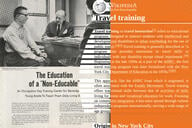You have /5 articles left.
Sign up for a free account or log in.
Last week’s IHE piece about flagship universities recruiting out-of-state students for the tuition premium hit a bit close to home. Having sent both kids to out-of-state flagships (at substantially higher tuition than Rutgers, our state’s flagship), I am part of the problem. Having said that, the piece leaves out the obvious solution, so I’ll advocate for it here and just disclose up front that, yes, this would have saved my family quite a bit of money.
Ban out-of-state tuition premiums. That would reduce universities’ incentive to recruit out-of-state, but it wouldn’t trap students in the state in which their parents happen to live. A single federal law or regulation—maybe attached to Title IV eligibility—should do it. Some states have taken baby steps in this direction: Maine, for example, allows students from several Northeastern states to attend the University of Maine at the same tuition level that their state’s flagship would charge an in-state student. Presumably, the motivation is the declining number of new high school graduates in Maine. The argument to Maine’s taxpayers would be that students who are lured there for college are likelier to stay and work there and start families there than students who never set foot in the state. Giving up the prospect of some out-of-state tuition may result in more students, eventually building the state’s economy.
Ryan Craig’s piece is quite right that many universities see out-of-state students as cash cows. Using students that way has enabled them to maintain levels of programming that declining real state support otherwise wouldn’t allow. The problem with that is twofold. First, it’s exploitative of students. Second, those levels of programming draw students and funding away from more access-oriented institutions, effectively reinforcing what is already a pretty rigid status hierarchy.
Over time, legislatures get accustomed to underfunding without apparent consequence. That might be defensible if the freed-up money were redirected to the regional four-years and community colleges, but it hasn’t been.
This is a live issue in my own state. New Jersey’s K-12 system is one of the best funded and highest ranked in the country: it’s nearly always ranked in the top three, duking it out with Massachusetts and Connecticut. But it’s in the bottom five nationally for public support for community colleges, and it’s a major net exporter of college students. High-achieving high school students leave the state in droves, my kids among them. As an economic-development strategy, it’s madness, but it’s what we have.
I managed to cajole my kids into applying to Rutgers, just in case the financial aid offers from their preferred places were untenable, but they really didn’t want to. They just wanted to see another part of the world and stretch their wings. I couldn’t blame them; growing up in Rochester, N.Y., one of my nonnegotiables for college was getting out of Rochester. In retrospect, it wasn’t really about the place itself; it was about wanting to be someplace new where I could find my own way. They inherited that gene. We were lucky to be able to let them do that, though it would have been infinitely easier without the “you’re not from around here, are you?” tax.
Losing the out-of-state premium would mean being able to drop the shenanigans around “getting residency” that some schools know all too well. As more classes are offered online, it would get around the fundamental silliness of charging out-of-state tuition for courses that can be taken from anywhere.
The obvious objection to this idea would be that it would constitute a significant financial hit to the flagships that recruit lots of out-of-state students. (Alternately, they could raise tuition to average the revenue out, but the politics of that are tricky.) That’s true, and it’s probably why the current system is likely to stick around awhile. But when the core argument for exploitation is that it’s too expensive not to, that’s a sign that something is fundamentally wrong.
Allowing legislatures an easy way out has encouraged them to take it. From the perspective of a given flagship institution, the economic argument for bringing in high-paying out-of-state students is hard to resist. Delete the “high-paying” part, and we open up more options for students from families of modest means, and we force a certain honesty on legislatures. Maine has shown that it can be done. Do that, and we can force a serious conversation about state support that doesn’t rely on taxation without representation.



